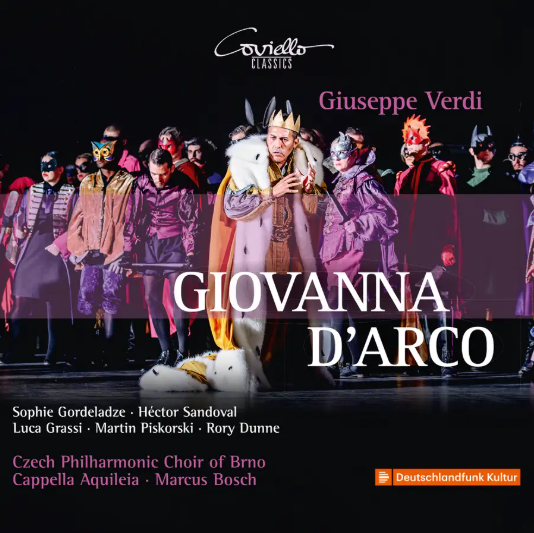VERDI Giovanna d’Arco (Bosch)
View record and artist detailsRecord and Artist Details
Genre:
Opera
Label: Coviello
Magazine Review Date: 12/2024
Media Format: CD or Download
Media Runtime: 120
Mastering:
DDD
Catalogue Number: COV92422

Tracks:
| Composition | Artist Credit |
|---|---|
| Giovanna d'Arco, 'Joan of Arc' |
Giuseppe Verdi, Composer
Cappella Aquileia Czech Philharmonic Choir or Brno Héctor Sandoval, Carlo VII, Tenor Luca Grassi, Giacomo, Baritone Marcus Bosch, Conductor Martin Piskorski, Delil, Tenor Orchestra of Opernfestspiele Heidenheim Rory Dunne, Talbot, Bass-baritone Sophie Gordeladze, Giovanna, Soprano |
Author: David Patrick Stearns
Joan of Arc haunts the opera repertoire – an ideal opera heroine who inspired composers from Verdi to Tchaikovsky to Honegger – though in works that haven’t quite cracked the standard repertoire. Verdi’s version, premiered in 1845, seems to have the most to forgive, with music that the composer eclipsed in later works and a wayward libretto that has been described as watered-down Victor Hugo. No trial as such. No burning stake. Verdi wasn’t yet the master of emotional tone; during some passages the music is either one-dimensional or non-committal in expressing the words. One thing the opera has going for it is its choral writing, which is often integrated into the plot with great effect. Solo moments abound for the three primary characters, though the routine-by-Verdi-standards music is often buoyed up by surrounding choral music. Joan’s prologue aria ‘Sempre all’alba ed alla sera’ shows what the voice can do; her more dramatically involving ensembles and choruses include the Act 3 ‘Addio, terra!’.
The beauty of this production is how effectively the dramaturgical lapses are reframed by an alternative staging concept, this one by Ulrich Proschka. The real-life Joan was said to hear voices. What does that say to modern audiences? Schizophrenia. Thus, Joan spends the opera in a modern hospital gown, drawing super-hero portraits of medieval warriors, being strapped down for electroconvulsive therapy, bearing a forehead scar from a frontal lobotomy but consorting with period-dress characters that exist just outside the walls of her ward.
Resetting an opera in a psychiatric ward is almost a cliché. But here, is she in an alternative universe inside her head? Reliving a past life? The ambiguity makes the staging more interesting. Modern-dress doctors represent the British forces keeping her from the France-saving battles she longs to fight. The two main male characters exist in separate worlds. The dauphin – Carlo VII and possibly Joan’s lover – is in royal medieval dress and seen mostly outside the magic circle that is her ward. Her modern-world father Giacomo is in league with the British to save his daughter from what he considers her madness and/or demonic possession. Outside the circle, the medieval-era chorus – looking like a masked ball on absinthe – alternately inspires her to an exalted destiny or tempts her into a more worldly ruin. Different sides of the same coin?
The concept is not a tight fit – these things rarely are – but it’s close enough to make a difference to this opera’s fortunes in the future. Some details in the original Temistocle Solera libretto, such as a much-discussed enchanted oak tree, are lost but not missed. I could do without some of the stage business, like Carlo nonchalantly tossing his crown around as if it’s a plaything. But with the action focused on the small hospital room, the emphasis is on the emotional relationships between the three main characters, which taps the opera’s power in ways that a conventional production might not.
The key component is title-role soprano Sophie Gordeladze, who has the clean vocalism of a soubrette but with extra weight in the lower register backed by the warrior soul of Brünnhilde. Among the major recordings of Giovanna d’Arco, Montserrat Caballé (for James Levine) has an appropriate girlish timbre while Anna Netrebko (for Paolo Carignani) is more stentorian. Gordeladze is closer to Netrebko but manages the notes more precisely and, equally importantly, employs your protective instincts with her lost eyes but also innocence shifting into hyper awareness.
The men are both up against Plácido Domingo comparisons (he’s the tenor for the Warner set and baritone for DG). As Carlo, tenor Héctor Sandoval may not have vocal glamour but more than does the job, especially in his last-act lament ‘Quale più fido amico’. As the father Giacomo, baritone Luca Grassi has a peripheral wobble that gives him extra paternal authority – which is needed to supply the sense of gravity when Verdi does not.
Conductor Marcus Bosch maintains a healthy balance between giving singers what they need but keeping a vital, headlong pace in an opera that’s much more gripping if listeners don’t have the objective distance allowed by slower tempos. And – thanks also to the excellent, theatrically adept Czech Philharmonic Choir of Brno – the opera is gripping indeed. Though also available in sound-only format, Blu ray is definitely the preferable format.
Discover the world's largest classical music catalogue with Presto Music.

Gramophone Digital Club
- Digital Edition
- Digital Archive
- Reviews Database
- Full website access
From £8.75 / month
Subscribe
Gramophone Full Club
- Print Edition
- Digital Edition
- Digital Archive
- Reviews Database
- Full website access
From £11.00 / month
Subscribe
If you are a library, university or other organisation that would be interested in an institutional subscription to Gramophone please click here for further information.




